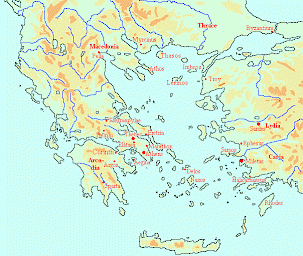Herodotus, bk 9, logos 28
Herodotus of Halicarnassus (c.480-c.429 BCE): Greek researcher, often called the world's first historian. In The Histories, he describes the expansion of the Achaemenid Empire under its kings Cyrus the Great, Cambyses, and Darius I the Great, culminating in Xerxes' expedition to Greece (480 BCE), which met with disaster in the naval engagement at Salamis and the battles at Plataea and Mycale. Herodotus' book also contains ethnographic descriptions of the peoples that the Persians have conquered, fairy tales, gossip, and legends.
Concluding logos: the foundation of the Athenian empire (9.114-122)

After the victory at Mycale, the Greek navy sails to the Hellespont, where the Greeks discover that the bridges have already been destroyed. According to the Spartan king Leotychides, the leader of the expedition, this means that they can go home. The Athenians, however, decide to stay where they are, and lay siege to Sestos, a small but important citadel, commanding the entrance of the Hellespont. Their commander is Xanthippus, and after some time he takes the city. The Persian commander Artayctes tries to escape but is caught and crucified on the spot where the abutment of Xerxes' bridges had been.
This short logos ends with a story about the cruelty of Xerxes' wife Amestris and an anecdote on one of Artayctes' ancestors, Artembares, a contemporary of the Persian king Cyrus the Great. When the latter had defeated the Median leader Astyages, Artembares had suggested to migrate to a more fertile country. Cyrus had objected, saying that rich soils produce weak warriors.
Comment
This final logos is extremely short (nine sections), which suggests that Herodotus' Histories are unfinished. This can be corroborated by Herodotus' repeated but unfulfilled promise to tell a tale about Assyria.note Likewise, the announcement to describe the death of the traitor of Thermopylae, Ephialtes,note is incorrect.
On the other hand, the first and last of the three concluding stories are well chosen. Xanthippus' action meant the beginning of the Athenian empire, which was to dominate the fifty years between the Persian War and the publication of The Histories. And Cyrus' remark summarizes how Herodotus thought about military power (cf. Croesus' advice to Cyrus). To Herodotus - and to any Greek of his age - it was clear that the Persians had been brave warriors in the days of Cyrus and Cambyses, but that they had succumbed to the luxuries of peace; the Greeks had won the war against the Persians because they inhabited a poor quarter of the world.